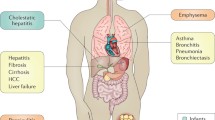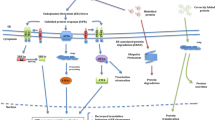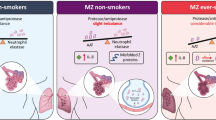Abstract
Purpose of Review
Commonly categorized as a rare disease, alpha-1 antitrypsin deficiency (AATD) is neither rare, when compared to many other genetic disorders, nor an actual disease, but rather a predisposition toward a wide variety of diseases. It is one of the most common genetic disorders which can lead to a spectrum of clinical manifestations, ranging from no symptoms to progressively debilitating systemic disease, most commonly affecting the lung and liver. It is therefore imperative for clinicians to recognize and be familiar with the spectrum of presentations, methods of diagnosis, and clinical management of AATD. It is also imperative for scientists to recognize the potential for progress in the management of this disorder.
Recent Findings
This review focuses on the current state of knowledge of AATD, including the wide range of presentations, diagnosis, and clinical management. In addition to the clinical implications of severe AATD, we discuss the relevance of heterozygous state with mild or moderate AATD in the development of both lung and liver disease. While our understanding of the multiple roles of alpha-1 antitrypsin (AAT) is on the rise, with appreciation of its immunomodulatory, anti-infective, and anti-inflammatory properties, this knowledge has yet to impact our ability to predict outcomes. We discuss nuances of augmentation therapy and review novel therapeutic approaches currently under investigation.
Summary
With the expanding knowledge about the complexities of AAT function and its clinical relevance, and with the increasing ability to diagnose early and intervene on AATD, it should be our goal to change the perception of AATD as a correctable inherited disorder rather than a fatal disease.

Similar content being viewed by others
Change history
12 September 2020
The original version of this article contained errors in Table 3 on page 6.
References
Papers of particular interest, published recently, have been highlighted as: • Of importance •• Of major importance
Laurell CB, Eriksson S. The electrophoretic alpha1-globulin pattern of serum in alpha1-antitrypsin deficiency. 1963. COPD. 2013;10(Suppl 1):3–8.
Greene CM, Marciniak SJ, Teckman J, Ferrarotti I, Brantly ML, Lomas DA, et al. alpha1-Antitrypsin deficiency. Nat Rev Dis Primers. 2016;2:16051.
Stoller JK, Aboussouan LS. A review of alpha1-antitrypsin deficiency. Am J Respir Crit Care Med. 2012;185(3):246–59.
Mahadeva R, Chang WSW, Dafforn TR, Oakley DJ, Foreman RC, Calvin J, et al. Heteropolymerization of S, I, and Z alpha1-antitrypsin and liver cirrhosis. J Clin Invest. 1999;103(7):999–1006.
Ferrarotti I, Thun GA, Zorzetto M, Ottaviani S, Imboden M, Schindler C, et al. Serum levels and genotype distribution of alpha1-antitrypsin in the general population. Thorax. 2012;67(8):669–74.
•• Al Ashry HS, Strange C. COPD in individuals with the PiMZ alpha-1 antitrypsin genotype. Eur Respir Rev. 2017;26(146) COMMENT: This review highlights the risk of emphysema in MZ individuals especially in the setting of smoking.
• Ortega VE, et al. The effects of rare SERPINA1 variants on lung function and emphysema in SPIROMICS. Am J Respir Crit Care Med. 2020;201(5):540–54 COMMENT: This study demonstrates the effects of Pi Z heterozygote and compound heterozygote genotypes have on lung function within a cohort of smokers.
Crystal RG. Alpha 1-antitrypsin deficiency, emphysema, and liver disease. Genetic basis and strategies for therapy. J Clin Invest. 1990;85(5):1343–52.
Janciauskiene S. Conformational properties of serine proteinase inhibitors (serpins) confer multiple pathophysiological roles. Biochim Biophys Acta. 2001;1535(3):221–35.
Stoller JK, et al. American Thoracic Society/European Respiratory Society statement: standards for the diagnosis and management of individuals with alpha-1 antitrypsin deficiency. Pneumologie. 2005;59(1):36–68.
American Thoracic, S. and S. European Respiratory, American Thoracic Society/European Respiratory Society statement: standards for the diagnosis and management of individuals with alpha-1 antitrypsin deficiency. Am J Respir Crit Care Med, 2003. 168(7): p. 818–900.
Blanco I, Bueno P, Diego I, Pérez-Holanda S, Lara B, Casas-Maldonado F, et al. Alpha-1 antitrypsin Pi*SZ genotype: estimated prevalence and number of SZ subjects worldwide. Int J Chron Obstruct Pulmon Dis. 2017;12:1683–94.
Strange C. Anti-proteases and alpha-1 antitrypsin augmentation therapy. Respir Care. 2018;63(6):690–8.
•• Janciauskiene S, Welte T. Well-known and less well-known functions of alpha-1 antitrypsin. Its role in chronic obstructive pulmonary disease and other disease developments. Ann Am Thorac Soc. 2016;13(Suppl 4):S280–8 COMMENT: This article provides a comprehensive review of the lesser known functions of AAT and its role in disease management of AATD as well as other diseases not related to AATD.
Janciauskiene SM, Bals R, Koczulla R, Vogelmeier C, Köhnlein T, Welte T. The discovery of alpha1-antitrypsin and its role in health and disease. Respir Med. 2011;105(8):1129–39.
Tonelli AR, Brantly ML. Augmentation therapy in alpha-1 antitrypsin deficiency: advances and controversies. Ther Adv Respir Dis. 2010;4(5):289–312.
Mahadeva R, Lomas DA. Genetics and respiratory disease. 2. Alpha 1-antitrypsin deficiency, cirrhosis and emphysema. Thorax. 1998;53(6):501–5.
Sanders CL, Ponte A, Kueppers F. The effects of inflammation on alpha 1 antitrypsin levels in a national screening cohort. COPD. 2018;15(1):10–6.
Law RH, Zhang Q, McGowan S, Buckle AM, Silverman GA, Wong W, et al. An overview of the serpin superfamily. Genome Biol. 2006;7(5):216.
Duvoix A, Roussel BD, Lomas DA. Molecular pathogenesis of alpha-1-antitrypsin deficiency. Rev Mal Respir. 2014;31(10):992–1002.
Hunt JM, Tuder R. Alpha 1 anti-trypsin: one protein, many functions. Curr Mol Med. 2012;12(7):827–35.
Janciauskiene S, Larsson S, Larsson P, Virtala R, Jansson L, Stevens T. Inhibition of lipopolysaccharide-mediated human monocyte activation, in vitro, by alpha1-antitrypsin. Biochem Biophys Res Commun. 2004;321(3):592–600.
Song S. Alpha-1 antitrypsin therapy for autoimmune disorders. Chronic Obstr Pulm Dis. 2018;5(4):289–301.
Cosio MG, Bazzan E, Rigobello C, Tinè M, Turato G, Baraldo S, et al. Alpha-1 antitrypsin deficiency: beyond the protease/antiprotease paradigm. Ann Am Thorac Soc. 2016;13(Suppl 4):S305–10.
Lewis EC. Expanding the clinical indications for alpha(1)-antitrypsin therapy. Mol Med. 2012;18:957–70.
Marcondes AM, Li X, Tabellini L, Bartenstein M, Kabacka J, Sale GE, et al. Inhibition of IL-32 activation by alpha-1 antitrypsin suppresses alloreactivity and increases survival in an allogeneic murine marrow transplantation model. Blood. 2011;118(18):5031–9.
Toldo S, Seropian IM, Mezzaroma E, van Tassell BW, Salloum FN, Lewis EC, et al. Alpha-1 antitrypsin inhibits caspase-1 and protects from acute myocardial ischemia-reperfusion injury. J Mol Cell Cardiol. 2011;51(2):244–51.
Guttman O, et al. alpha1-Antitrypsin modifies general NK cell interactions with dendritic cells and specific interactions with islet beta-cells in favor of protection from autoimmune diabetes. Immunology. 2014.
Rivera-Nieves J, Bamias G, Vidrich A, Marini M, Pizarro TT, McDuffie MJ, et al. Emergence of perianal fistulizing disease in the SAMP1/YitFc mouse, a spontaneous model of chronic ileitis. Gastroenterology. 2003;124(4):972–82.
Grimstein C, Choi YK, Wasserfall CH, Satoh M, Atkinson MA, Brantly ML, et al. Alpha-1 antitrypsin protein and gene therapies decrease autoimmunity and delay arthritis development in mouse model. J Transl Med. 2011;9:21.
Daemen MA, et al. Functional protection by acute phase proteins alpha(1)-acid glycoprotein and alpha(1)-antitrypsin against ischemia/reperfusion injury by preventing apoptosis and inflammation. Circulation. 2000;102(12):1420–6.
Hersh CP. Diagnosing alpha-1 antitrypsin deficiency: the first step in precision medicine. F1000Res. 2017, 2049;6.
de Serres F, Blanco I. Role of alpha-1 antitrypsin in human health and disease. J Intern Med. 2014;276(4):311–35.
Campos MA, Wanner A, Zhang G, Sandhaus RA. Trends in the diagnosis of symptomatic patients with alpha1-antitrypsin deficiency between 1968 and 2003. Chest. 2005;128(3):1179–86.
de Serres FJ. Worldwide racial and ethnic distribution of alpha1-antitrypsin deficiency: summary of an analysis of published genetic epidemiologic surveys. Chest. 2002;122(5):1818–29.
Stockley RA, et al. Individualized lung function trends in alpha-1-antitrypsin deficiency: a need for patience in order to provide patient centered management? Int J Chron Obstruct Pulmon Dis. 2016;11:1745–56.
Tanash HA, et al. Survival in individuals with severe alpha 1-antitrypsin deficiency (PiZZ) in comparison to a general population with known smoking habits. Eur Respir J. 2017:50(3).
Hersh CP, Campbell EJ, Scott LR, Raby BA. Alpha-1 antitrypsin deficiency as an incidental finding in clinical genetic testing. Am J Respir Crit Care Med. 2019;199(2):246–8.
Tanash HA, Nilsson PM, Nilsson JÅ, Piitulainen E. Survival in severe alpha-1-antitrypsin deficiency (PiZZ). Respir Res. 2010;11:44.
Larsson C. Natural history and life expectancy in severe alpha1-antitrypsin deficiency, Pi Z. Acta Med Scand. 1978;204(5):345–51.
Stoller JK, Tomashefski J Jr, Crystal RG, Arroliga A, Strange C, Killian DN, et al. Mortality in individuals with severe deficiency of alpha1-antitrypsin: findings from the National Heart, Lung, and Blood Institute Registry. Chest. 2005;127(4):1196–204.
Mahr AD, Edberg JC, Stone JH, Hoffman GS, St.Clair EW, Specks U, et al. Alpha(1)-antitrypsin deficiency-related alleles Z and S and the risk of Wegener’s granulomatosis. Arthritis Rheum. 2010;62(12):3760–7.
Davis ID, Burke B, Freese D, Sharp HL, Kim Y. The pathologic spectrum of the nephropathy associated with alpha 1-antitrypsin deficiency. Hum Pathol. 1992;23(1):57–62.
Yang P, Tremaine WJ, Meyer RL, Prakash UBS. Alpha1-antitrypsin deficiency and inflammatory bowel diseases. Mayo Clin Proc. 2000;75(5):450–5.
Lomas DA. The selective advantage of alpha1-antitrypsin deficiency. Am J Respir Crit Care Med. 2006;173(10):1072–7.
Townsend SA, Edgar RG, Ellis PR, Kantas D, Newsome PN, Turner AM. Systematic review: the natural history of alpha-1 antitrypsin deficiency, and associated liver disease. Aliment Pharmacol Ther. 2018;47(7):877–85.
Mitchell EL, Khan Z. Liver disease in alpha-1 antitrypsin deficiency: current approaches and future directions. Curr Pathobiol Rep. 2017;5(3):243–52.
Beiko T, Strange C. Anxiety and depression in patients with alpha-1 antitrypsin deficiency: current insights and impact on quality of life. Ther Clin Risk Manag. 2019;15:959–64.
Zacherle E, N.J, Runken MC, Blanchette CM. Health care cost and utilization associated with alpha-1 antitrypsin deficiency among a cohort of medicare beneficiaries with COPD. Value in Health. 2015.
Chorostowska-Wynimko J, Barrecheguren M, Ferrarotti I, Greulich T, Sandhaus RA, Campos M. New patient-centric approaches to the management of alpha-1 antitrypsin deficiency. Int J Chron Obstruct Pulmon Dis. 2020;15:345–55.
Sandhaus RA, Turino G, Brantly ML, Campos M, Cross CE, Goodman K, et al. The diagnosis and management of alpha-1 antitrypsin deficiency in the adult. Chronic Obstr Pulm Dis. 2016;3(3):668–82.
Craig TJ. Suspecting and testing for alpha-1 antitrypsin deficiency-an allergist’s and/or immunologist’s perspective. J Allergy Clin Immunol Pract. 2015;3(4):506–11.
McElvaney NG. Diagnosing alpha1-antitrypsin deficiency: how to improve the current algorithm. Eur Respir Rev. 2015;24(135):52–7.
Greulich T, Ottaviani S, Bals R, Lepper PM, Vogelmeier C, Luisetti M, et al. Alpha1-antitrypsin deficiency - diagnostic testing and disease awareness in Germany and Italy. Respir Med. 2013;107(9):1400–8.
Piitulainen E, Mostafavi B, Tanash HA. Health status and lung function in the Swedish alpha 1-antitrypsin deficient cohort, identified by neonatal screening, at the age of 37-40 years. Int J Chron Obstruct Pulmon Dis. 2017;12:495–500.
•• Singh D, et al. Global strategy for the diagnosis, management, and prevention of chronic obstructive lung disease: the GOLD science committee report 2019. Eur Respir J. 2019;53(5) COMMENT: This article focuses on new research within the field of COPD and offers updated recommendations regarding its management.
Cooper CB, Barjaktarevic I. A new algorithm for the management of COPD. Lancet Respir Med. 2015;3(4):266–8.
Barjaktarevic IZ, Arredondo AF, Cooper CB. Positioning new pharmacotherapies for COPD. Int J Chron Obstruct Pulmon Dis. 2015;10:1427–42.
•• Lomas DA. New therapeutic targets for alpha-1 antitrypsin deficiency. Chronic Obstr Pulm Dis. 2018;5(4):233–43 COMMENT: This article provides a comprehensive review of the new approaches to treatment of liver disease in AATD.
Zamora M. Surgery for patients with alpha 1 antitrypsin deficiency: a review. Am J Surg. 2019;218(3):639–47.
Endoscopic lung volume reduction in patients with advanced emphysema due to alpha1 antitrypsin deficiency. https://clinicaltrials.gov/ct2/show/NCT01357460?type=Intr&cond=Alpha+1-Antitrypsin+Deficiency&draw=2&rank=15.
Lung volume reduction coils for emphysema in alpha-1 antitrypsin deficiency (LuReCAA). https://clinicaltrials.gov/ct2/show/NCT02273349?type=Intr&cond=Alpha+1-Antitrypsin+Deficiency&draw=2&rank=49.
Perotin JM, Leroy S, Marquette CH, Mal H, Dutau H, Bourdin A, et al. Endobronchial coil treatment in severe emphysema patients with alpha-1 antitrypsin deficiency. Int J Chron Obstruct Pulmon Dis. 2018;13:3645–9.
Brantly ML, Lascano JE, Shahmohammadi A. Intravenous alpha-1 antitrypsin therapy for alpha-1 antitrypsin deficiency: the current state of the evidence. Chronic Obstr Pulm Dis. 2018;6(1):100–14.
Wewers MD, Casolaro MA, Sellers SE, Swayze SC, McPhaul KM, Wittes JT, et al. Replacement therapy for alpha 1-antitrypsin deficiency associated with emphysema. N Engl J Med. 1987;316(17):1055–62.
RED BOOK® database. IBM Micromedex®, 2020.
Campos MA, Kueppers F, Stocks JM, Strange C, Chen J, Griffin R, et al. Safety and pharmacokinetics of 120 mg/kg versus 60 mg/kg weekly intravenous infusions of alpha-1 proteinase inhibitor in alpha-1 antitrypsin deficiency: a multicenter, randomized, double-blind, crossover study (SPARK). COPD. 2013;10(6):687–95.
Survival and FEV1 decline in individuals with severe deficiency of alpha1-antitrypsin. The Alpha-1-Antitrypsin Deficiency Registry Study Group. Am J Respir Crit Care Med, 1998. 158(1): p. 49–59.
Chapman KR, Stockley RA, Dawkins C, Wilkes MM, Navickis RJ. Augmentation therapy for alpha1 antitrypsin deficiency: a meta-analysis. COPD. 2009;6(3):177–84.
Chapman KR, Burdon JGW, Piitulainen E, Sandhaus RA, Seersholm N, Stocks JM, et al. Intravenous augmentation treatment and lung density in severe alpha1 antitrypsin deficiency (RAPID): a randomised, double-blind, placebo-controlled trial. Lancet. 2015;386(9991):360–8.
Barros-Tizon JC, et al. Reduction of severe exacerbations and hospitalization-derived costs in alpha-1-antitrypsin-deficient patients treated with alpha-1-antitrypsin augmentation therapy. Ther Adv Respir Dis. 2012;6(2):67–78.
Lieberman J. Augmentation therapy reduces frequency of lung infections in antitrypsin deficiency: a new hypothesis with supporting data. Chest. 2000;118(5):1480–5.
Dirksen A, Piitulainen E, Parr DG, Deng C, Wencker M, Shaker SB, et al. Exploring the role of CT densitometry: a randomised study of augmentation therapy in alpha1-antitrypsin deficiency. Eur Respir J. 2009;33(6):1345–53.
US Plasma Proteins Market Report The Marketing Research Bureau (MRB) Inc. , Aug 2019.
Sieluk J, Levy J, Sandhaus RA, Silverman H, Holm KE, Mullins CD. Costs of medical care among augmentation therapy users and non-users with alpha-1 antitrypsin deficiency in the United States. Chronic Obstr Pulm Dis. 2018;6(1):6–16.
Campos MA, Geraghty P, Holt G, Mendes E, Newby PR, Ma S, et al. The biological effects of double-dose alpha-1 antitrypsin augmentation therapy. A pilot clinical trial. Am J Respir Crit Care Med. 2019;200(3):318–26.
Stocks JM, Brantly ML, Wang-Smith L, Campos MA, Chapman KR, Kueppers F, et al. Pharmacokinetic comparability of Prolastin(R)-C to Prolastin(R) in alpha(1)-antitrypsin deficiency: a randomized study. BMC Clin Pharmacol. 2010;10:13.
Phase 1 study to assess the safety, PK and PD of INBRX-101 in adults with alpha-1 antitrypsin deficiency (rhAAT-Fc). https://clinicaltrials.gov/ct2/show/NCT03815396?type=Intr&cond=Alpha+1-Antitrypsin+Deficiency&draw=2&rank=2.
Evaluate efficacy and safety of "Kamada-AAT for Inhalation" in patients with AATD (InnovAATe). https://clinicaltrials.gov/ct2/show/NCT04204252?type=Intr&cond=Alpha+1-Antitrypsin+Deficiency&draw=2&rank=8.
Safety study of an aerosolized, recombinant alpha 1-antitrypsin in subjects with alpha 1-antitrypsin deficiency. https://clinicaltrials.gov/ct2/show/NCT00161707?type=Intr&cond=Alpha+1-Antitrypsin+Deficiency&draw=2&rank=11.
A 12-week study treating participants who have alpha1-antitrypsin-related COPD with alvelestat (MPH966) or placebo. (ASTRAEUS). https://clinicaltrials.gov/ct2/show/NCT03636347?type=Intr&cond=Alpha+1-Antitrypsin+Deficiency&draw=2&rank=50.
Safety dose finding study of ADVM-043 gene therapy to treat alpha-1 antitrypsin (A1AT) deficiency (ADVANCE). https://clinicaltrials.gov/ct2/show/NCT02168686?type=Intr&cond=Alpha+1-Antitrypsin+Deficiency&draw=2&rank=17.
Experimental gene transfer procedure to treat alpha 1-antitrypsin (AAT) deficiency (AAT). https://clinicaltrials.gov/ct2/show/NCT00430768?type=Intr&cond=Alpha+1-Antitrypsin+Deficiency&draw=2&rank=40.
Evaluation of the efficacy and safety of VX-814 in subjects with the PiZZ genotype. https://clinicaltrials.gov/ct2/show/NCT04167345?type=Intr&cond=Alpha+1-Antitrypsin+Deficiency&draw=2&rank=39.
Study of ARO-AAT in normal adult volunteers. https://clinicaltrials.gov/ct2/show/NCT03362242?type=Intr&cond=Alpha+1-Antitrypsin+Deficiency&draw=2&rank=38.
A study of an investigational drug, ALN-AAT, in healthy adult subjects and patients with ZZ type alpha-1 antitrypsin deficiency liver disease. https://clinicaltrials.gov/ct2/show/NCT02503683?type=Intr&cond=Alpha+1-Antitrypsin+Deficiency&draw=2&rank=41.
Carbamazepine in severe liver disease due to alpha-1 antitrypsin deficiency (CBZ). https://clinicaltrials.gov/ct2/show/NCT01379469?cond=Alpha+1-Antitrypsin+Deficiency&draw=2&rank=30.
Author information
Authors and Affiliations
Corresponding author
Ethics declarations
Conflict of Interest
Dr. Barjaktarevic reports grants and personal fees from GE Healthcare, Asta Zeneca, personal fees from GSK, grants and personal fees from Theravance, grants and personal fees from Mylan, grants from Amgen, personal fees from Boehringer Ingelheim, personal fees from Verona Pharma, personal fees from Grifols, and personal fees from CSL Behring, outside the submitted work. Dr. Cortes Lopez reports travel reimbursement from Vertex Pharmaceuticals.
Human and Animal Rights and Informed Consent
This article does not contain any studies with human or animal subjects performed by any of the authors.
Additional information
Publisher’s Note
Springer Nature remains neutral with regard to jurisdictional claims in published maps and institutional affiliations.
This article is part of the Topical Collection on Immune Deficiency and Dysregulation
Rights and permissions
About this article
Cite this article
Cortes-Lopez, R., Barjaktarevic, I. Alpha-1 Antitrypsin Deficiency: a Rare Disease?. Curr Allergy Asthma Rep 20, 51 (2020). https://doi.org/10.1007/s11882-020-00942-4
Published:
DOI: https://doi.org/10.1007/s11882-020-00942-4




